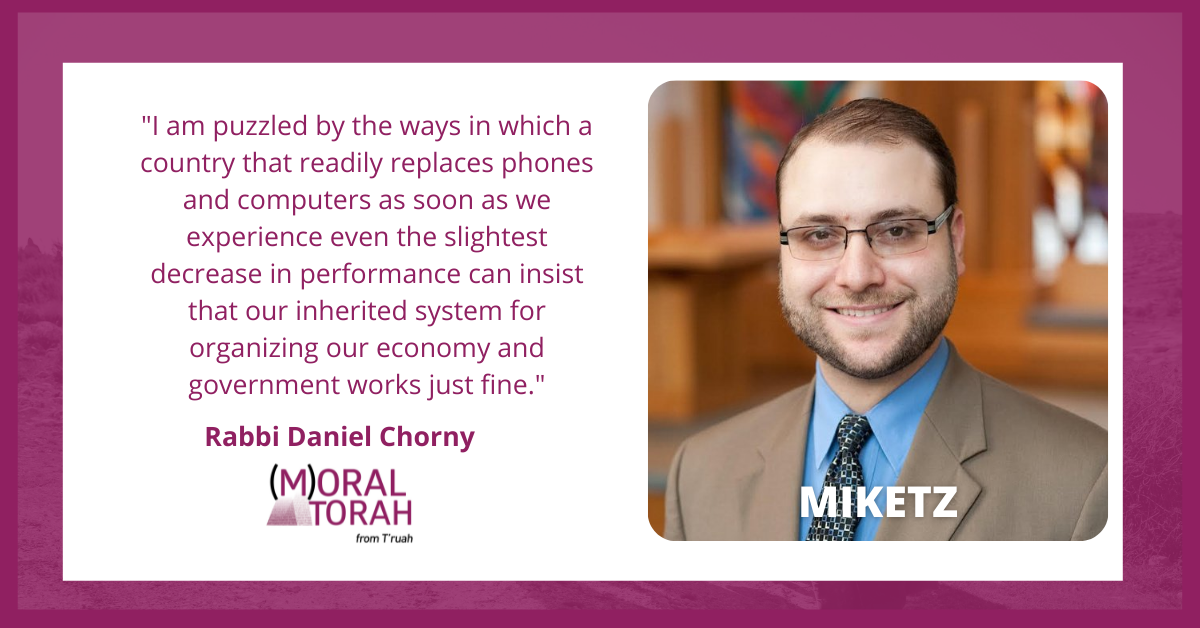A D’var Torah for Parshat Miketz by Rabbi Daniel Chorny
My daughter’s favorite movie, “Newsies,” recalls with great musical flare the New York City newsboys’ strike of 1899, which led to many advances in child labor laws. At a pivotal scene, Jack Kelley (Christian Bale) is arrested and brought before his rival, Joseph Pulitzer (Robert Duval). In the newspaper magnate’s office, adorned with expensive furniture and fine art, Jack is offered his freedom in exchange for breaking the strike. Pulitzer, who is not above bribing politicians and threatening dissenters, tells Jack that through his all-powerful newspaper, “I tell this city how to think. I tell this city how to vote. I shape its future.” Jack, who up until this point has led a life of poverty and strife and could really use a lucky break, must choose between helping himself and his comrades by falling in line for small concessions, or proceeding with the strike, come what may. Should he seize a small but important victory, or should he risk it all for a chance to better the lives of all New York’s children?
At the center of all activism lies a tension between incremental and revolutionary change: Are we meant to argue for women’s rights through our courts, or are we called to lobby for new legislation? Do we reduce our individual carbon footprints or push for business regulations and commitments to greener technologies? Should we make amendments to our current Constitution or convene a whole new convention with all Americans represented?
Sign up to receive (M)oral Torah in your inbox each week.
I am puzzled by the ways in which a country that readily replaces phones and computers as soon as we experience even the slightest decrease in performance can insist that our inherited system for organizing our economy and government works just fine. Even with over 770,000 American lives lost to the Covid-19 pandemic and countless more displaced by wilder fires, stronger hurricanes, droughts and shortages, there are still plenty of well-meaning, intelligent individuals who cannot imagine a more perfect union. We delude ourselves into thinking that we will be alright, that catastrophe will not reach us again. We believe the good times will keep coming, and we argue with anyone who tells us otherwise, dismissing visions of scarcity and collapse as dystopian fantasies, the stuff of bad dreams.
Our ancestors knew something about bad dreams. At every critical juncture within the Joseph story (Genesis 37-50), dreams play a pivotal role in driving the plot forward. Joseph dreamed of importance and prestige among his brothers, leading him to his enslavement to Potiphar. He garnered favor with the royal cupbearer by interpreting his dream of redemption, which in turn brought Joseph before Pharaoh, the most important dreamer of his day. Pharaoh’s dreams of plenty and famine precipitated Joseph’s ascent to the second highest office in the land. Despite the seven-year famine, life in Egypt was good to Joseph and his extended family.
But as we turn the scroll to the book of Shemot, it is clear that having a high rank in an unjust system does not guarantee perpetual happiness and success. The good times for Joseph’s family, now a large nation, did not last forever. Despite his technocratic skills and political prowess, Joseph’s legacy is the story of our fall into Egyptian slavery.
Find more commentaries on Miketz.
I would suggest that Joseph’s great mistake was not in enslaving all of Egypt to Pharaoh, as he does in next week’s parshah, thereby planting resentment that could turn the Egyptians against the Israelites in a few short generations (though that was perhaps unwise). Rather, it was buying into the established Egyptian power structure.
In Egypt, Pharaoh was considered a god, responsible for maintaining the cosmic order between the Heavens and the Earth. Pharaoh’s humanity is forgotten among his courtiers, servants, subjects, and even himself, claiming that “the Nile is my own; I made it for myself” (Ezekiel 29:3). This is the foundational problem — and, indeed, one of the reasons God needed to bring ten plagues on Egypt. For all the times Joseph attributed his skills and authority to the God of his forefathers (see Genesis 40:8; 41:16, 41:25, 41:28; 45:5-7), he left room for Pharaoh to claim supernatural power. For all his charisma and wisdom, “a new king arose over Egypt who did not know Joseph” (Exodus 1:8); the technocratic tinkering with a fundamentally unjust system did not withstand the test of time.
 At the end of “Newsies,” Jack makes the revolutionary choice to rejoin the strike. Using Pulitzer’s discarded old newspaper presses, he spreads awareness of the newsies’ cause to all the child laborers in New York, who climactically join in the fight. With this broad act of solidarity — and a little help from Governor Frank Delano Roosevelt — the newsies transform the conditions of their employment and the way children are viewed and cared for across America. Incremental change within systems will always be necessary and important; many inefficiencies and inequities can be addressed through proper management. Decisive revolutionary actions affirming human equality, however, are the stuff that dreams are made of.
At the end of “Newsies,” Jack makes the revolutionary choice to rejoin the strike. Using Pulitzer’s discarded old newspaper presses, he spreads awareness of the newsies’ cause to all the child laborers in New York, who climactically join in the fight. With this broad act of solidarity — and a little help from Governor Frank Delano Roosevelt — the newsies transform the conditions of their employment and the way children are viewed and cared for across America. Incremental change within systems will always be necessary and important; many inefficiencies and inequities can be addressed through proper management. Decisive revolutionary actions affirming human equality, however, are the stuff that dreams are made of.
Rabbi Daniel Chorny is the Torah School Director at Temple Beth Israel of Highland Park and Eagle Rock, in Los Angeles, where he is also active in CLUE (Clergy and Laity United for Economic Justice).

